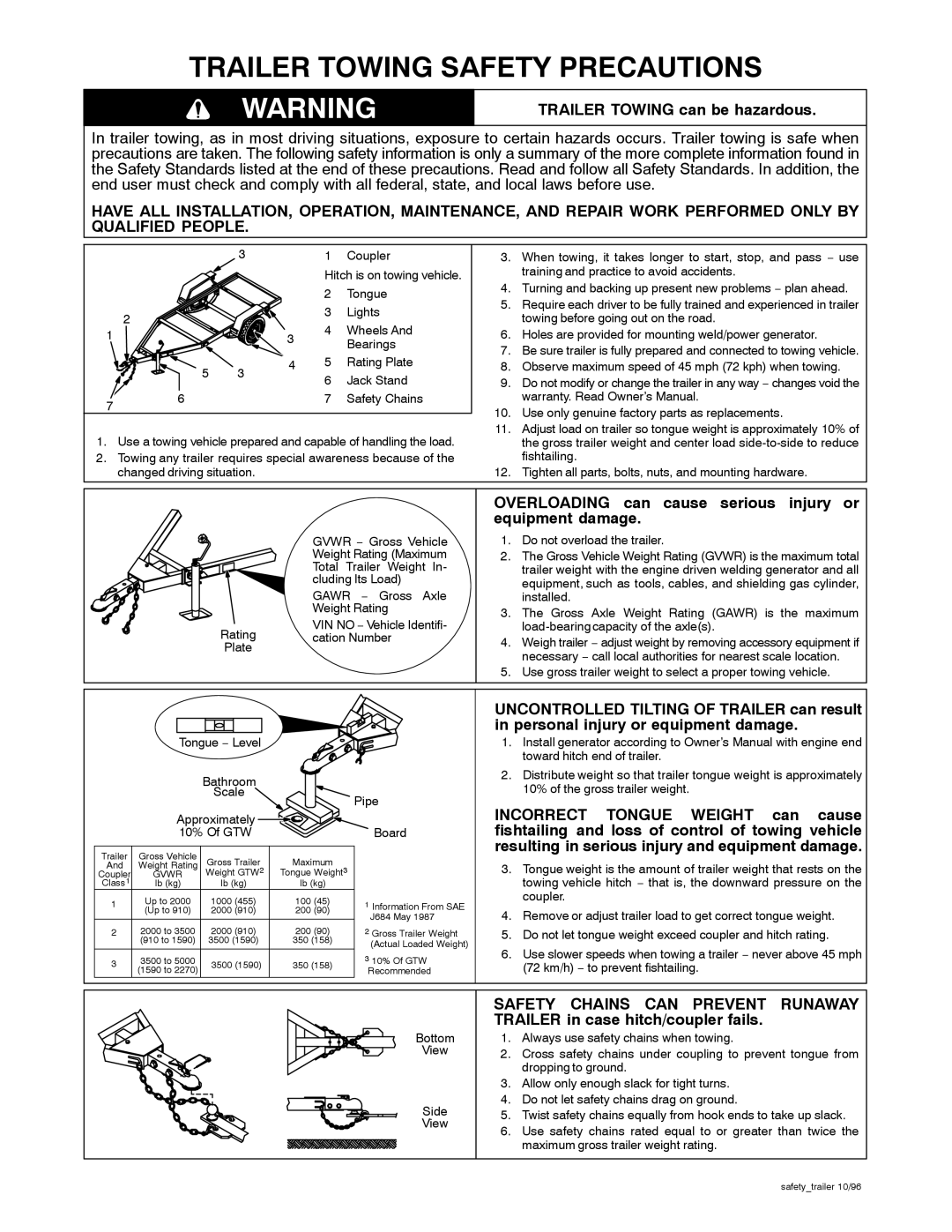
TRAILER TOWING SAFETY PRECAUTIONS
WARNING
TRAILER TOWING can be hazardous.
In trailer towing, as in most driving situations, exposure to certain hazards occurs. Trailer towing is safe when precautions are taken. The following safety information is only a summary of the more complete information found in the Safety Standards listed at the end of these precautions. Read and follow all Safety Standards. In addition, the end user must check and comply with all federal, state, and local laws before use.
HAVE ALL INSTALLATION, OPERATION, MAINTENANCE, AND REPAIR WORK PERFORMED ONLY BY QUALIFIED PEOPLE.
|
| 3 |
|
| 2 |
|
|
1 |
|
| 3 |
| 5 | 3 | 4 |
|
| ||
7 | 6 |
|
|
|
|
|
1 Coupler
Hitch is on towing vehicle.
2Tongue
3Lights
4Wheels And Bearings
5Rating Plate
6Jack Stand
7Safety Chains
3. | When towing, it takes longer to start, stop, and pass − use |
| training and practice to avoid accidents. |
4. | Turning and backing up present new problems − plan ahead. |
5. | Require each driver to be fully trained and experienced in trailer |
| towing before going out on the road. |
6. | Holes are provided for mounting weld/power generator. |
7. | Be sure trailer is fully prepared and connected to towing vehicle. |
8. | Observe maximum speed of 45 mph (72 kph) when towing. |
9. | Do not modify or change the trailer in any way − changes void the |
| warranty. Read Owner’s Manual. |
10. | Use only genuine factory parts as replacements. |
11. | Adjust load on trailer so tongue weight is approximately 10% of |
1.Use a towing vehicle prepared and capable of handling the load.
2.Towing any trailer requires special awareness because of the changed driving situation.
the gross trailer weight and center load |
fishtailing. |
12. Tighten all parts, bolts, nuts, and mounting hardware. |
Rating
Plate
GVWR − Gross Vehicle Weight Rating (Maximum Total Trailer Weight In- cluding Its Load)
GAWR − Gross Axle Weight Rating
VIN NO − Vehicle Identifi- cation Number
OVERLOADING can cause serious injury or equipment damage.
1.Do not overload the trailer.
2.The Gross Vehicle Weight Rating (GVWR) is the maximum total trailer weight with the engine driven welding generator and all equipment, such as tools, cables, and shielding gas cylinder, installed.
3.The Gross Axle Weight Rating (GAWR) is the maximum
4.Weigh trailer − adjust weight by removing accessory equipment if necessary − call local authorities for nearest scale location.
5.Use gross trailer weight to select a proper towing vehicle.
| Tongue − Level |
|
|
| ||
|
| Bathroom |
|
|
| |
|
| Scale |
| Pipe | ||
|
|
|
| |||
| Approximately |
|
|
| ||
| 10% Of GTW |
|
| Board | ||
Trailer | Gross Vehicle | Gross Trailer | Maximum |
|
| |
And | Weight Rating |
|
| |||
Coupler | GVWR | Weight GTW2 | Tongue Weight3 |
|
| |
Class1 | lb (kg) | lb (kg) | lb (kg) |
|
| |
1 | Up to 2000 | 1000 (455) | 100 (45) | 1 | Information From SAE | |
(Up to 910) | 2000 (910) | 200 (90) | ||||
|
| J684 May 1987 | ||||
|
|
|
|
| ||
2 | 2000 to 3500 | 2000 (910) | 200 (90) | 2 | Gross Trailer Weight | |
| (910 to 1590) | 3500 (1590) | 350 (158) |
| (Actual Loaded Weight) | |
|
|
|
|
| ||
3 | 3500 to 5000 | 3500 (1590) | 350 (158) | 3 | 10% Of GTW | |
(1590 to 2270) | Recommended | |||||
|
|
| ||||
UNCONTROLLED TILTING OF TRAILER can result in personal injury or equipment damage.
1.Install generator according to Owner’s Manual with engine end toward hitch end of trailer.
2.Distribute weight so that trailer tongue weight is approximately 10% of the gross trailer weight.
INCORRECT TONGUE WEIGHT can cause fishtailing and loss of control of towing vehicle resulting in serious injury and equipment damage.
3.Tongue weight is the amount of trailer weight that rests on the towing vehicle hitch − that is, the downward pressure on the coupler.
4.Remove or adjust trailer load to get correct tongue weight.
5.Do not let tongue weight exceed coupler and hitch rating.
6.Use slower speeds when towing a trailer − never above 45 mph (72 km/h) − to prevent fishtailing.
Bottom
View
Side
View
SAFETY CHAINS CAN PREVENT RUNAWAY TRAILER in case hitch/coupler fails.
1.Always use safety chains when towing.
2.Cross safety chains under coupling to prevent tongue from dropping to ground.
3.Allow only enough slack for tight turns.
4.Do not let safety chains drag on ground.
5.Twist safety chains equally from hook ends to take up slack.
6.Use safety chains rated equal to or greater than twice the maximum gross trailer weight rating.
safety_trailer 10/96
